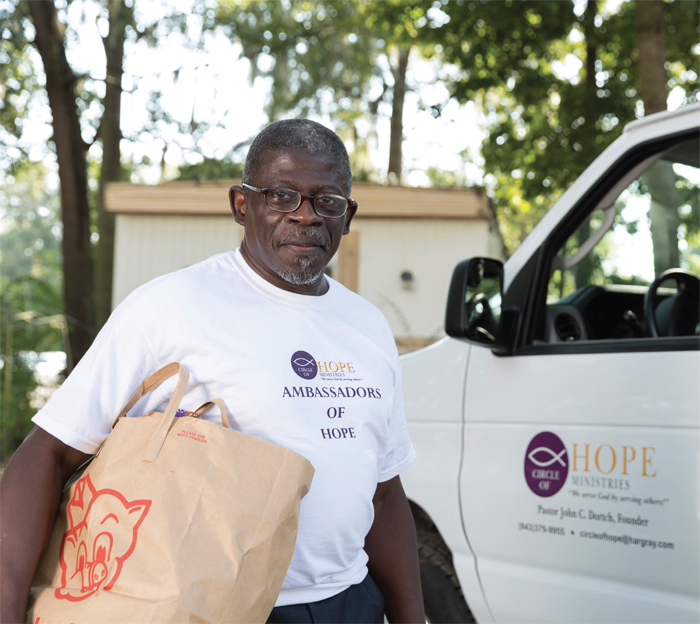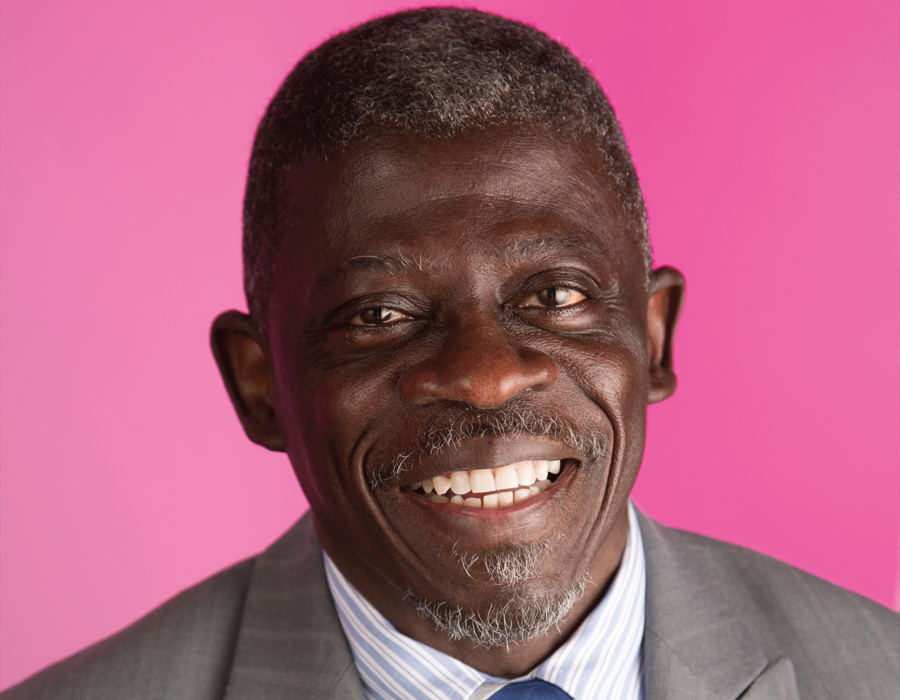John Dortch: An Ambassador of Hope

This is not a story of good triumphing over evil, or saints vs. sinners. This is a story of a rise, and then a fall from grace, hard work, introspection, and some very deep rooted faith that would finally take hold, again, and walk a limping man to his own recovery. It’s not as simple as finding the road to redemption; it’s not an easy task to look in the mirror every morning and know that people have been hurt as a result of your actions. It’s not that easy to forgive yourself; far less easy than to forgive someone else.
This is the kind of journey where people can hold out their hand to you along the way, they can give you a hug, but they can’t walk by your
side; you got into it on your own and you’ve got to get out of it the same way. Plenty of people held out their hands to this man; although
there were dissenters, there were believers in his essential goodness, his willingness and dedication to finding his way back home, and into the arms of his God.
John Dortch’s story is not a glib tale of the prodigal son getting caught up in the wrong crowd, making a mistake and making amends. This is a man whose actions ultimately led, inadvertently and indirectly, to the death of another human being. 1Let’s start at the beginning. The son of a Baptist minister, John was born in Beaufort and had three siblings. John enjoyed a unique childhood; he started school when he was just three years old, when he was four he went to work shining shoes in his father’s shop. “By the time I went to grade school, I had saved $300; I could pay for my own books and those of my siblings.” It turns out that he was a gifted musician, and the summer between seventh and eighth grades, he played the trumpet in the all state band. During those school summers, he worked shining shoes over on Parris Island where he might make $100 a day. In his senior year at Robert Smalls, he was captain of both the football and basketball teams.
After graduation, John attended Howard University in Washington DC. There he pledged two fraternities and set his sights on becoming an attorney. However, he delayed that objective when he joined the ROTC, went to summer camp, and out of 3000 students, placed in the top ten. He was a Distinguished Military Graduate from Howard University and at 22, volunteered to go to Vietnam.
Long story short – he was injured while saving someone’s life on a search and destroy mission when the landing craft he was on came under heavy fire. John got a medical retirement and went back to the States. At the time, he did not realize that his experiences in Vietnam had occasioned him to suffer from PTSD, which would probably last for the rest of his life.Back in DC, John went to work for New York Life Insurance Co. and quickly became their top salesman. A rising star in all that he had accomplished so far, John was the golden boy. This is when his trajectory changed.
After five years of selling life insurance, John decided to start a business. He hired several employees and planned to train them to generate income to invest back into the community. One thing led to another and the income wasn’t as forthcoming as he had projected, so John chose an aberrational course in the opposite direction. He trained five men to rob banks.
A tremendous amount of planning went into this endeavor, and when asked why he thought he could get away with it, he responded, “I rebelled against the system. I didn’t think we were getting a fair shake. This operation was well planned and thought out, we had an inside person, the combination to the vault, we knew the security system, and it was planned like a precise military operation. We spent six weeks planning it, we knew when the armored truck was arriving with the money and we thought we could get $1.5 million.”
The robbery was interrupted long before anyone even got to the door of the bank, because, unbeknownst to them, the police had been tipped off. Dortch and his accomplice John Bryant, were just exiting their car when two police officers arrived on the scene to question them. Dortch escaped and Bryant fled into an underground parking lot where he was detained by a young black female police officer. Bryant shot the police officer in the arm while she was on the radio calling for help; the bullet passed through her arm and lodged in her chest, killing her. Dortch turned himself into the police the next morning. When asked if he remembered feeling remorse for this series of events, he answered, “Remorse set in the minute I first heard about her death.”
John Dortch was sentenced to fifteen years to life and incarcerated in federal prison facilities from 1975 to 1990. According to a document from the District of Columbia Court of Appeals, “‘By all accounts,” as the Committee on Admissions states in its report, “Dortch was a model prisoner during his fifteen years of incarceration.’ He received training in accounting and earned money working in the Federal Prison Industries program. Dortch also participated in educational and churchrelated activities, tutored and assisted other inmates, and directed a prison chapter of NAACP. Prison officials commended him for his excellent institutional adjustment. Dortch was paroled by the United States Parole Commission at his first eligibility date and he returned to Washington DC in the spring of 1990.”
In March of 1990, John Dortch applied to be the business manager of Covenant Baptist Church in DC and got involved in the ministry. But after a year and a half there, his dream of studying law resurfaced and he resigned his position to attend the David A. Clark School of Law. After graduation, he passed the bar examinations in the District of Columbia, West Virginia and Maryland. But thereafter, he says, “I knew I was being called to the ministry. So I left a six figure job to come back here and write my
memoirs.”
“After completing my book, first I became a deacon, then an ordained and licensed minister. I served as pastor of Central Baptist Church, and I fell in love with the congregation. But after two years, I was moved in my spirit to pursue a vision that God gave me thirty-five years ago. My
calling is to be a doer of the Word: feed the hungered, clothe the naked, shelter the homeless, minister to the sick and visit the prisoners. “That vision was manifested in the establishment of the Circle of Hope Ministries, a 401(c)(3) faith-faith, based charitable organization, a church without
walls. We are all volunteers. There is no higher calling than being a servant. At night, when I take an inventory of my day, the last question I ask myself is ‘Did you help someone today?’ If I can respond ‘Yes,’ then I have had a successful day.”
Again, this is not the story of the son of a preacher who goes astray, reconnects with his faith, and comes back home to serve his
people and God, because that would be too pat. Pastor John Dortch is to be commended for his bravery in stepping up to the plate and telling his story because it exposes his underbelly as well as his accomplishments. He was determined when he was released from prison to speak frankly and
unabashedly about his experience because “I was determined to not build the rest of my life on a lie.” When asked if he could pick just one, what the defining moment was in his life so far. His response was “The prison experience. From my center, everything I’ve done has brought me to where I am now. I’ve been on both sides so I can relate and bridge both worlds. Out of the bad came the good.”
What was his motivating factor in writing Memoirs Of The Prodigal Son: The Road To Redemption? “I have a testimony to share; my memoir is about the unconditional love of God and his redeeming grace. I wanted to be an inspiration to people, to let them know they can overcome anything in life and there is always hope.”
Redemption, full circle, restitution; they are all just words. “I was told by my mother as a child that she and I were dreamers, that
we had the gift.” They both had an identical vision of a sphere of light entering their bodies at a crucial time – she when she was in
with him, he was he was experiencing one of his darkest moments in prison – the light saved them both. The biggest light that shines out of Pastor John Dortch is hope, and the circle of love that surrounds him: Circle of Hope Ministries.
Story by MARY ELLEN THOMPSON • Photography by PAUL NURNBERG




